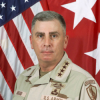John Abizaid

John Abizaid
John Philip Abizaidis a retired United States Army general and former U.S. Central Commandcommander, overseeing American military operations in a 27-country region, from the Horn of Africa, the Arabian Peninsula, to South and Central Asia, covering much of the Middle East. CENTCOM oversees 250,000 US troops. Abizaid succeeded General Tommy Franks as Commander, USCENTCOM, on July 7, 2003, and was also elevated to the rank of four-star general the same week. He was succeeded by Admiral William J. Fallon on...
NationalityAmerican
ProfessionSoldier
Date of Birth1 April 1951
CountryUnited States of America
But the key shift in focus will be from counter-insurgency operations to more and more cooperation with Iraqi security forces and to building Iraqi security capacity.
But clearly the fact that we've gone from zero Iraqi security forces on duty in May to up to 200,000 today is an enormous accomplishment, but it's not enough.
The United States is the most powerful nation on Earth and it just can't walk away from the Middle East and central Asia and the Horn of Africa.
I believe we've... we've worked very hard with the Iraqis to build a better place ever since the fall of Saddam's government.
It's clear to me now that we've got to reach out to the Arab Sunni community in particular in an effort to cause some moderate political activity to take place so they join the future of Iraq.
Everybody needs to understand that I learned Arabic from the United States Army as a second language. I never spoke it at home.
Well, the hardest thing to do, as we know from our own experience on 9/11 is protect everything all the time.
And over time, I think, as Iraqi security capacity builds, you'll see American and coalition presence there decline.
Capturing any member of any terrorist cell or any insurgent cell that we may happen to come across is always very, very valuable, and the thing that interests me is that in most instances after a time people talk and they tell us what they know.
But my Arabic is pretty good. It's good enough to have conversations with people, to understand what they say, to understand what they're feeling.
We'll try to include Iraqi officers in our staffs. We will do everything we can to empower Iraqi security forces to stand up on their own and operate where they can alone.
Undoubtedly, there are members of the former regime that are cooperating in some fashion and then there are extremists that are within Iraq that are cooperating with them.
Oh, the transition concerns me because as we move towards an important political event, it's clear to me that the terrorists and insurgents will move as hard as they can to disrupt this process.
But the truth of the matter is that there is there is an opportunity for them to participate in the economic and political future of the country and certainly in the security life of the country.